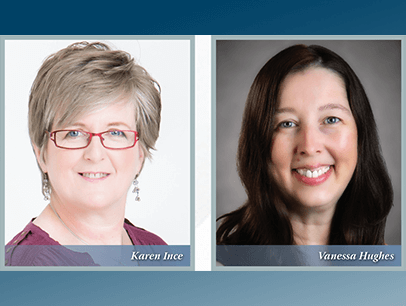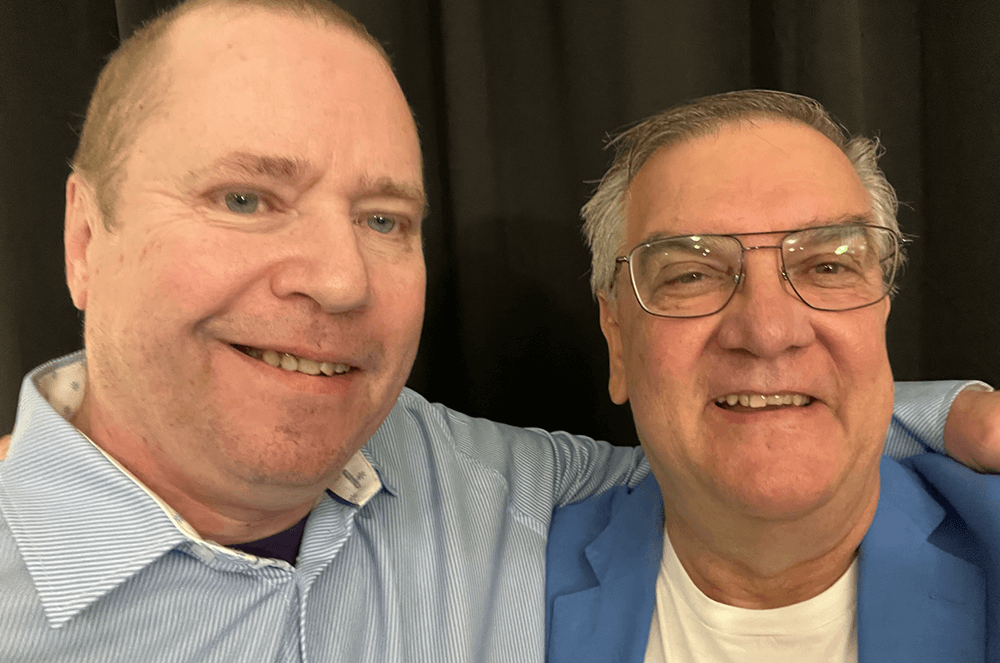After three years in Toastmasters, Tracy Zhang completed the first 10 speeches in the former education program and achieved the Competent Communicator milestone. Then she felt stalled.
She attended an Area speech contest and was so impressed with one of the officers, Mark Hayes, DTM, she asked him to be her mentor. Zhang wanted a knowledgeable, experienced, and trusted adviser to help her get more out of her Toastmasters experience.
 Tracy Zhang
Tracy ZhangThis was her first Toastmasters mentoring experience. At their initial meeting, she was nervous. “I was in awe of DTMs, and English is my second language,” says the Canadian member. Hayes made her feel relaxed and laid out her path to becoming a Distinguished Toastmaster. He showed her step-by-step how she could achieve it.
Zhang followed his guidance, and five years later, became a DTM. She’s now a member of two clubs in Mississauga, Ontario, Canada: Miracle Chinese English Bilingual Toastmasters, a club she helped establish, and Candu Toastmasters.
“Mentoring changed my Toastmasters journey and my life,” she says. Her mentor showed her the way to achieve something she never thought she could.
Why You Should Be a Mentor
Emotional rewards
Now Zhang serves as a mentor, trying to help and inspire others like her mentor did for her. “People walk in the door to Toastmasters and don’t realize how their lives will change,” she says. “I want to show them how great they can become.”
The opportunity to help others is a driving force for mentors. Like Zhang, many mentors also want to give back through the program that helped them, as well as enjoy meeting people.
 Peter Temesvary
Peter TemesvaryWhen you serve as a mentor, you connect with members in a different way. “In club meetings, there is often little opportunity to get to know each other,” says Peter Temesvary, of Skylarks Toastmasters in Budapest, Hungary. Serving as a mentor offers time to get to know people beyond the information members share through meeting roles or quick conversations before or after meetings.
 Andre Lins
Andre LinsMentoring also offers you new ways to build relationships and connect with the club. André Lins, DTM, formerly of Rio Toastmasters in Rio de Janeiro, Brazil, says, “Mentoring increased my confidence that I can help other people succeed, which gives me a sense of pride and belonging.”
Skill development
In addition to emotional rewards, mentors gain and strengthen their skills. By assisting someone else, you can improve your own communication, speaking, and listening skills. Depending on the relationship, you can also develop teaching, counseling, or coaching skills. You can apply these skills within your Toastmasters experience and beyond.
Lins says he mentored so many people over the years that he developed a sharp eye for quickly detecting people’s talents and true personality. “I carried this skill over to other roles in my life—mostly for hiring people in my company, as well as to entertain groups in relaxed non-business settings,” he says.
New ideas
While mentors may be more experienced in some areas, they can still learn from their mentees. Temesvary starts each mentoring relationship by hoping to grow himself. “I always ask my mentees to challenge me,” he says. “The best mentoring relationships were the ones that turned into two-way growth. I’ve had mentees challenge me to step up in contests, take part in club or Area activities, and try new speaking styles.”
One time, Temesvary was mentoring a new member who came to the first meeting with a long list of speech topics even before the Ice Breaker. Through the relationship, Temesvary learned to write down anything that might be a good speech topic and how to look at simple events from many angles in search of a good story. Another mentee helped him transition from the former Toastmasters education program’s advanced manuals to the Pathways program.
As a mentor, you can learn new ideas, gain new perspectives, and discover new methods of approaching people, topics, and situations. You can also increase your self-awareness and insight into the way others think. Because Toastmasters is a global organization, mentors often connect with people from other cultures, which helps expand their understanding of the world.

Tips for Mentors
Establish a personal connection
The mentor-mentee relationship is key to a mentee’s success. It’s important to develop a rapport with your mentee. To do so, Lins shares stories about his life. “You will know it is working when the mentee opens up and starts to share too, allowing you two to bond and create a friendship,” he says.
Zhang remembers how much her mentor made her feel comfortable at the start of their relationship, including letting her decide how and when they should meet. She chose her favorite place to eat, which was comforting for her and calmed her nerves.

When Oyin Egbeyemi, DTM, from Eagle Club in Lagos, Nigeria, mentors a new member, she also likes to make her mentee feel comfortable and not overwhelmed by the Toastmasters program. “This is very important to me because many people come to Toastmasters to overcome their fear of communication and public speaking,” she says. “It is best to demystify any concerns or apprehension.”
Understand a mentee’s priorities and goals
New members might need help getting to know the Toastmasters program and the club culture, but it doesn’t mean they’re new to public speaking or leadership. Whether you’re mentoring a new or experienced member, it’s important to understand their goals and areas of focus.
Once Egbeyemi establishes the personal connection with new members, she asks what their life objectives are and the role that Toastmasters will potentially play. This helps to clarify their vision and set objectives. She encourages mentees to give their Ice Breaker speech as soon as possible to minimize any build-up of anxiety. Afterward, she suggests doing one speech and one role each month, which is what her own mentor suggested to her. As her mentees gain experience, she recommends they give speeches at other clubs to challenge themselves in front of new audiences.
It’s important to recognize that a mentee’s priorities will change over time. For longer-term mentoring relationships, it’s good to check in with mentees frequently about their goals and adapt to any changing needs.
Temesvary emphasizes that everyone has a different way of writing, practicing, and preparing a speech. “As a mentor, it’s not your job to teach them your way of doing things,” he says. “You are there to hold a mirror for them as they pursue their own way.”
Set expectations
Many club mentoring programs have concrete timeframes for mentoring relationships, such as a specific number of months or speeches. If your relationship is outside of a formal program, it’s still important to agree on a timeframe at the start. You can always revisit and adapt later.
For more experienced mentees, you could set a specific goal, such as a speech contest or work-related presentation. Whatever the focus, it’s important you discuss the specific parameters of the relationship to ensure the commitment is clear for both of you.

It’s also essential to talk about how, how often, and when you will meet. While some mentors and mentees might prefer getting together in person, many are using the range of technological options available to connect, including telephone and video calls, audio recordings, email messages, and shared documents.
“A good mentor needs to be flexible in terms of availability,” says Temesvary. “The pandemic was a good learning experience, which showed that online platforms are a perfectly good solution for mentoring.”
Even years before the pandemic, one of Egbeyemi’s mentees would email her audio recordings of a speech. “I found this to be a very efficient way to give feedback,” she says.
Some clubs may offer mentoring beyond the traditional mentor-mentee pairing. One example is group mentoring, where one or multiple mentors can be available to a number of mentees. Another example is an on-call mentor, who can be available for club meetings or engage with a member for a one-time advising session. It’s essential to establish expectations for these types of arrangements too.
Resources for Mentors
If you’re looking for additional guidance on how to be an effective mentor in Toastmasters, there are many resources available.
Pathways Level 2
Recognizing the importance of mentoring, every Pathways path has a required Level 2 “Introduction to Toastmasters Mentoring” speech project. You will learn all about mentoring—from the role of mentors and mentees to the traits of successful mentors to how you can be the best mentor possible.
Pathways Mentor Program
Once you complete Level 2 in your path, you have the opportunity to participate in the Toastmasters Pathways Mentor Program. This program (which is a separate program and not a part of the Level 2 “Introduction to Toastmasters Mentoring” project) helps you hone your skills and involves two mentoring projects—one short-term and one six months in length.
Other mentors
“Remember the support that you got when you first joined Toastmasters and give it back to someone else,” says Egbeyemi. “If you didn’t get the support you desired, then do your best to ensure your mentees do not share this experience.”
You can always ask other experienced members what has worked for them. Also, mentors are never too experienced to benefit from their own mentor. Even if you’ve been a mentor for decades, there is always something you can learn—from a new speaking style to a creative topic angle to a new technology. Consider asking another member to mentor you who is strong in whatever area you’re seeking to improve.
Mentoring offers just as many benefits to mentors as it does to mentees. So, consider being a Toastmasters mentor. Whether through an official program or an informal opportunity, you can make a difference in someone’s life, as well as your own.
Jennifer L Blanck, DTM has more than 25 years of career development and advising experience. She is a member of 5-Star Toastmasters Club in Arlington, Virginia, and AAMC Toastmasters in Washington, D.C., as well as a regular contributor to the Toastmaster magazine. Learn more at jenniferlblanck.com
Related Articles

Mentorship
The Advantages of an Atypical Mentorship

Mentorship



 Previous
Previous

 Previous Article
Previous Article